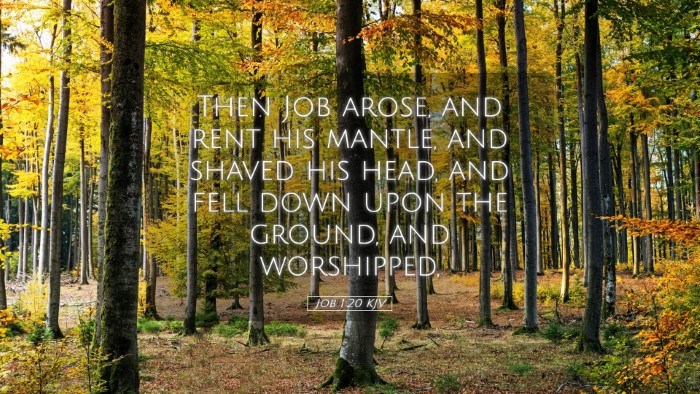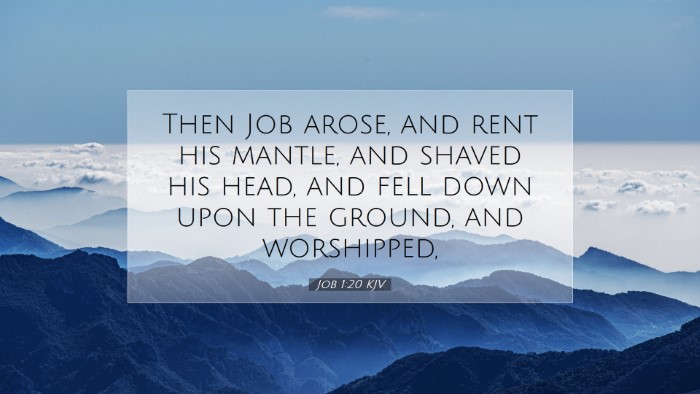Old Testament
Genesis Exodus Leviticus Numbers Deuteronomy Joshua Judges Ruth 1 Samuel 2 Samuel 1 Kings 2 Kings 1 Chronicles 2 Chronicles Ezra Nehemiah Esther Job Psalms Proverbs Ecclesiastes Song of Solomon Isaiah Jeremiah Lamentations Ezekiel Daniel Hosea Joel Amos Obadiah Jonah Micah Nahum Habakkuk Zephaniah Haggai Zechariah MalachiJob 1:20
Job 1:20 KJV
Then Job arose, and rent his mantle, and shaved his head, and fell down upon the ground, and worshipped,
Job 1:20 Bible Commentary
Commentary on Job 1:20
Job 1:20 (ESV): "Then Job arose and tore his robe and shaved his head and fell on the ground and worshiped."
Introduction
This verse depicts a profound moment in the life of Job, representing both his immense grief and remarkable faith. It sets the stage for understanding the character of Job, his trials, and his response to suffering. Various commentaries shed light on the layers of meaning in Job's actions and the theological implications they hold for believers today.
Job's Immediate Response
Upon hearing the devastating news of the loss of his children and worldly possessions, Job's initial reaction was one of deep mourning. Commentators emphasize the dual expressions of grief and worship:
- Tearing of the robe: This act is a traditional Jewish sign of deep grief and mourning, a physical representation of the emotional turmoil within (Henry).
- Shaving of the head: Another customary expression of sorrow in ancient cultures, representing a profound sense of loss and humility before God (Barnes).
Theological Significance of Mourning
Job's actions affirm that mourning is a natural human response to suffering. Adam Clarke notes that the act of mourning is not contrary to faith; rather, it can coexist with worship, providing a holistic view of human emotions in the face of tragedy. This understanding encourages believers to express their sorrow while maintaining a focus on their faith in God.
Worship Amid Suffering
One of the most striking elements of Job's response is his act of worship following his grief. This juxtaposition highlights several key aspects:
- The Nature of True Worship: True worship transcends circumstances. Job worshipped God despite his overwhelming loss, which indicates his deep understanding of God's sovereignty (Henry).
- Faith Over Feelings: Job’s decision to worship instead of succumbing to despair illustrates a profound statement about faith. Clarke points out that authentic faith often shines brightest in moments of trial.
Job's Understanding of God
Job’s immediate action of worship also reflects his understanding of God’s nature. His response demonstrates that he recognized God as sovereign over his circumstances:
- The Sovereignty of God: The acknowledgment that God is in control, even in tragedy, is pivotal in Job’s theology (Barnes). Job did not question God's authority but worshipped Him in acknowledgment of that authority.
- God's Character: Job's worship indicates his belief in God’s righteousness and faithfulness, despite the personal calamity he faced. This view challenges believers to trust in God’s goodness even when life does not make sense.
Applications for Today
Various insights from this commentary can be applied to contemporary Christian life:
- Responding to Suffering: Believers are encouraged to approach suffering with honesty, expressing grief while clinging to faith. Job's example serves as a model for handling life's difficulties.
- The Importance of Worship: Worship should remain at the center of a believer’s life, even during trials. Job’s worship amid loss encourages Christians to maintain their spiritual practices in times of struggle.
- Understanding God's Sovereignty: A robust theology of God's sovereignty can provide comfort. Reflecting on Job’s recognition of God’s control helps believers navigate their suffering with hope.
Conclusion
Job 1:20 serves as a powerful testament to the human experience of suffering, grief, and the challenge of maintaining faith. The insights gathered from various public domain commentaries reflect the depth of Job's character and the profound theological implications of his actions. For pastors, students, theologians, and scholars, this passage offers rich material for contemplation on how to navigate life’s challenges while remaining steadfast in faith and worship.


